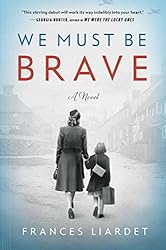We Must Be Brave
Penguin Publising
464 pp.
ISBN-13: 9780735218864 Lee-ARE-detFrom the publisherTimes UKQuestions issued by the publisher
Summary
Spanning the sweep of the twentieth century, We Must Be Brave explores the fierce love that we feel for our children and the power of that love to endure. Beyond distance, beyond time, beyond life itself.
One woman. One little girl. The war that changed everything.
December 1940.
In the disorderly evacuation of Southampton, England, newly married Ellen Parr finds a small child asleep on the backseat of an empty bus. No one knows who little Pamela is.
Ellen professed not to want children with her older husband, and when she takes Pamela into her home and rapidly into her heart, she discovers that this is true: Ellen doesn't want children. She wants only Pamela.
Three golden years pass as the Second World War rages on. Then one day Pamela is taken away, screaming. Ellen is no stranger to sorrow, but when she returns to the quiet village life she's long lived, she finds herself asking: In a world changed by war, is it fair to wish for an unchanged heart?
In the spirit of We Were the Lucky Ones and The Nightingale, here is a novel about courage and kindness, hardship and friendship, and the astonishing power of love. (From the publisher.)
Author Bio
Frances Liardet () was born in the 1960s, a child of children of the Second World War. She has an MA in creative writing from the University of East Anglia and studied Arabic at Oxford, before traveling to Cairo to translate modern Egyptian novelists, including Naguib Mahfouz and Edwar al-Kharrat.
Liardet currently lives in Somerset, England, with her husband and daughter, and helps to run a summer writing session called Bootcamp. We Must Be Brave is her American debut. (.)
Book Reviews
Ellen, beset by hardship from a young age, ends up happy in a marriage blanc with the much older Selwyn, and is convinced she doesn’t want children until Pamela arrives. Then she experiences an all-consuming love that Liardet captures on the page with a heartbreaking conviction.
()
Dazzling.… As a testament to parental love and its relationship to the heartbreaking, healing, almost ungraspable passage of time, We Must Be Brave is a great success: richly observed, lovingly drawn, and determinedly clear-eyed to the last.
Guardian (UK)
Poignant and absorbing.
People
Deeply moving.… A stunningly accurate portrayal of the all-encompassing depth of a mother’s love (whether she’s the biological mother or not). Read it and weep.
AARP Magazine
Liardet’s lovely book [is] about love and loss, and our chosen families. Dare you not to weep.
Woman’s Day
Beautifully written. Its scope is ambitious, as it seeks to portray the longtime ravages that the war and its attendance upheavals perpetrated upon the home front.… [This historical war novel] is different and original.
Historical Novel Review
[A] moving American debut, set in WWII England, follows a childless woman discovering joy after she begins caring for a young girl.… Readers will be captivated by Ellen’s story, which is bolstered by a swift plot and characters who realistically and memorably grow.
Publishers Weekly
Though touted as World War II historical fiction, this tearjerker about motherhood and loss has more in common with M.L. Stedman's The Light Between Oceans.… [A] quirky cast of characters… [and a] slightly rushed ending of a story stretch[es] across several decades. —Mara Bandy Fass, Champaign P.L., IL
Library Journal
This chronicle of an Englishwoman’s life across the middle of the 20th century radiates love and suffering through a caring but incomplete marriage, war, and aching affection for other people’s children.… [An] understated yet blazing story of hearts wounded and restored.
Kirkus Reviews
Discussion Questions
1. Ellen has a tough childhood, especially once her family moves into the Absaloms. How does Ellen’s youth shape her? Were you surprised to learn of Ellen’s difficult past?
2. How did you feel about Ellen’s marriage to Selwyn? Do you agree with her decision to sacrifice the possibility of a family at such a young age? Why or why not?
3. If Ellen doesn’t want children, why does Pamela affect her as she does? Discuss how their relationship evolves. How does Pamela change Ellen?
4. In the beginning, Selwyn is less willing than Ellen to bring Pamela into their home. Why? Does his opinion change over time? How does fatherhood change Selwyn? How is his experience with Pamela different from Ellen’s?
5. Do you agree with Ellen’s decision to let Pamela leave with Aubrey? Why or why not? If you disagree, what would you have done? What life do you think would have been best for Pamela?
6. How does World War II change the villagers of Upton? How does it change Ellen? In what ways would this novel be different if it had been set in a time of peace?
7. Through poverty and success, Ellen is supported by many people in Upton. How do these friendships shape her life? Do you feel as though you have a similar community in your life? Why or why not?
8. On p. 310, Lucy and Ellen reflect on their choices, and Lucy tells Ellen if she’d married Bob Coward, she might have "got the full bowl." What does Lucy mean? How does Ellen feel about the question? Do you think she got "the full bowl" in the end?
9. How is Penny different than Pamela? Why do you think Ellen conflates the two? What does Penny teach Ellen?
10. Were you surprised by the ending? Why or why not?
(.)


